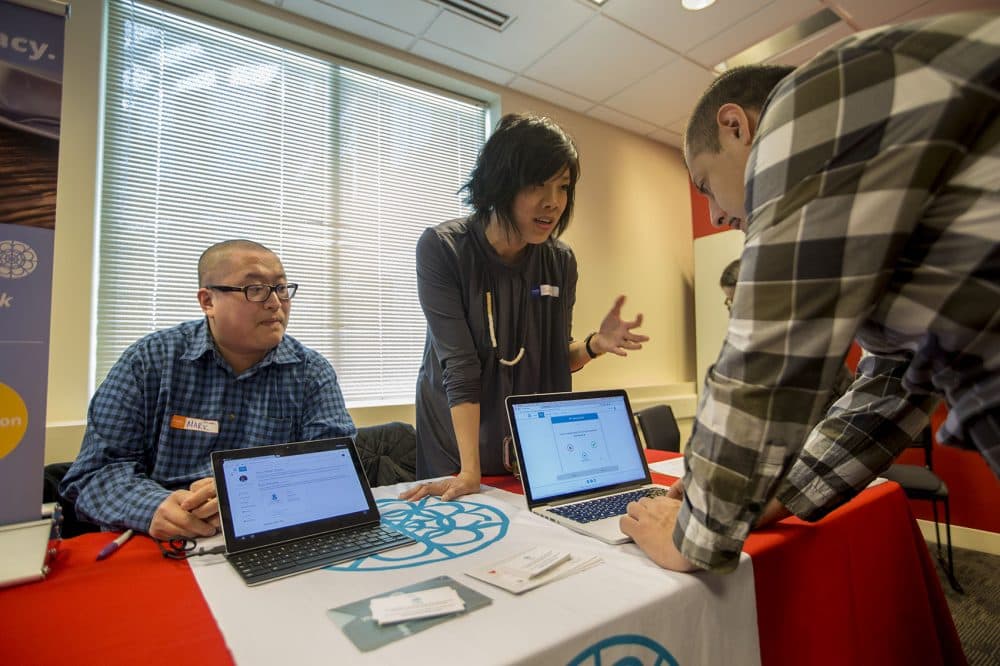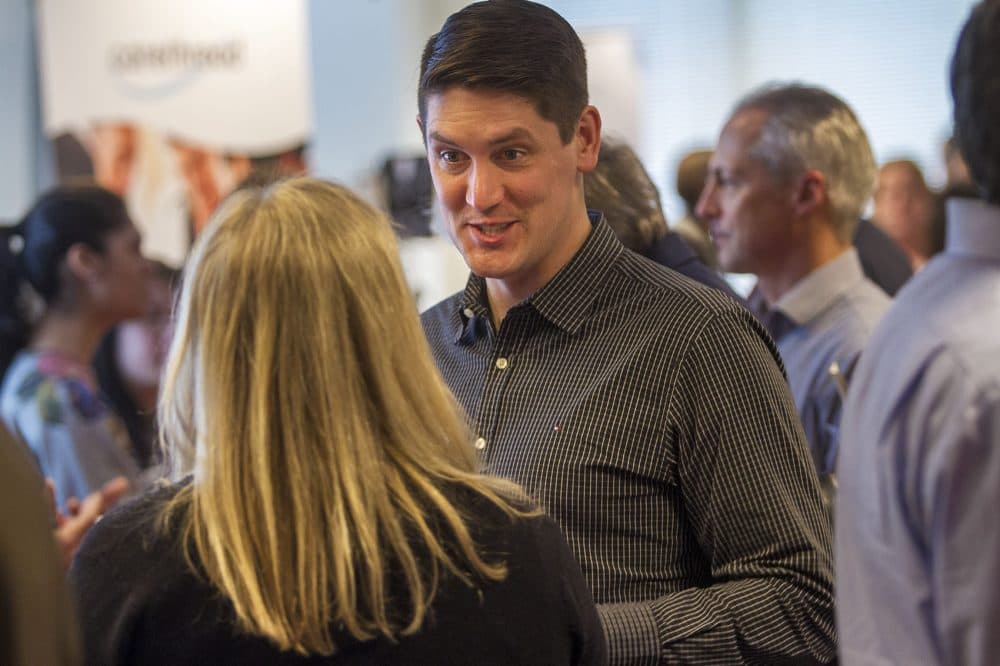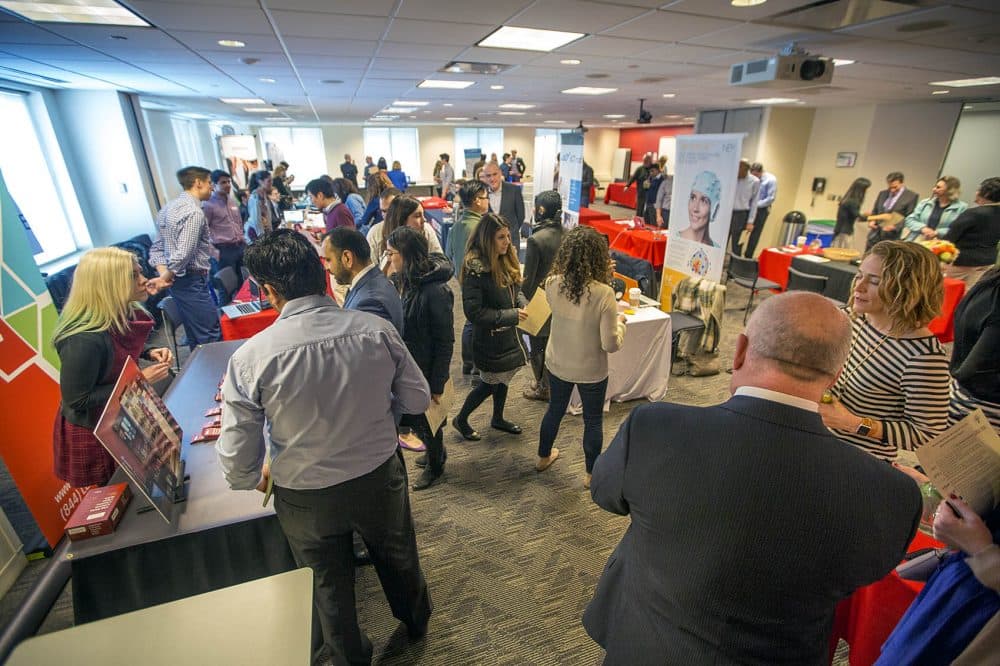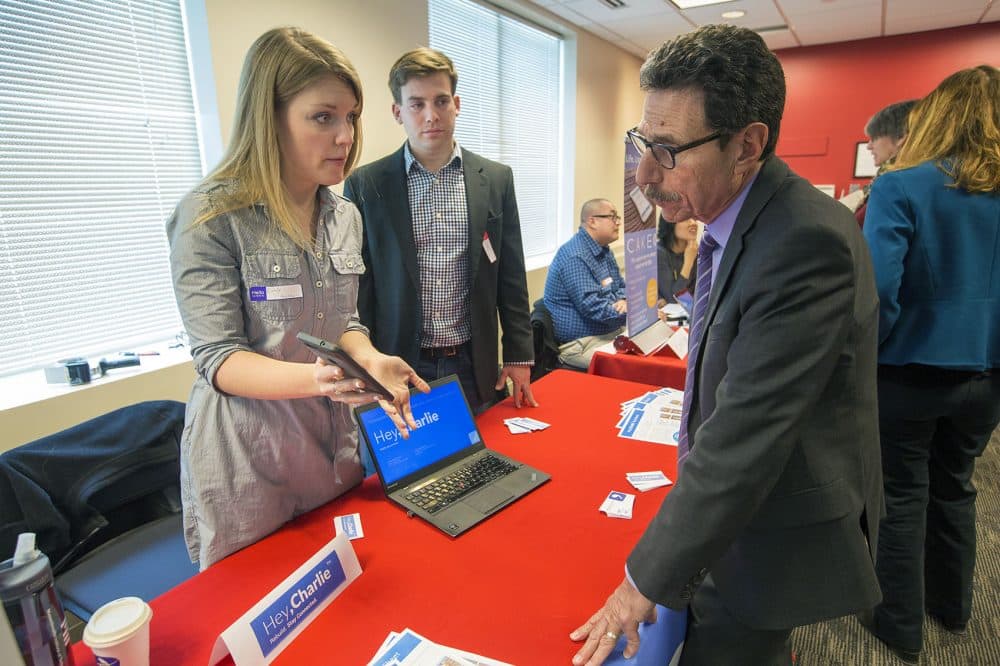Advertisement
From Dying Wishes To Support For Substance Users: How 5 Health Startups Tackle Tough Problems
Resume
How can you make decisions about your own death more enjoyable? Or nudge recovering opioid addicts away from unhealthy social contacts? Or find the perfect caregiver to mind your aging, sometimes prickly, parent?
These are a few of the difficult problems that a slew of digital health startups are trying to solve as part of a competition led by PULSE@MassChallenge, a health-focused nonprofit startup accelerator in Boston.
The 31 startups were selected from among more than 430 applicants from 30 states and 20 countries, says Nick Dougherty, Pulse's program director. Dougherty's own MassChallenge-spawned startup, VerbalCare, which helps stroke and other patients communicate, got acquired in 2015 by Medical Specialties Distributors.
Under the new program, each of the competing startups is matched with a corporate partner — a big name in health care — and after setting goals and milestones, the most promising companies that demonstrate impact, value and market potential will be awarded cash grants — portions of $250,000 — in June. Winners will be chosen by a panel of health care experts.
Launching any new company is hard enough, Dougherty says. But health care startups are particularly tricky. There's a changing regulatory landscape, which makes identifying revenue streams difficult, he says. And there's the very precarious nature of the venture itself.
"Naturally, this ecosystem has to be risk averse because if you fail at what you're doing, lives are on the line," Dougherty says.

For background: Pulse@MassChallenge was launched last year, after Gov. Charlie Baker announced a statewide digital health initiative to broaden the sector within Massachusetts and make the state a digital hub.
Bostonomix is following several PULSE startups as they try to reach their goals, fine-tune their products, and figure out the best path toward commercialization. We met with them at the Pulse lab, an 8,000-square-foot space at the Hatch Fenway offices in the Landmark Center in Boston, and then followed a few around as they worked through various obstacles and challenges building their businesses.
We picked them based on their interesting backstories, the scope of the problems they're trying to solve and on their availability and willingness to talk to a reporter. Here are a few snapshots:
Cake
Cake's founders, MIT engineer Suelin Chen and palliative care Dr. Mark Zhang, want to help make decisions about death feel easier, even celebratory — like "a piece of cake."
That may sound like a hard sell, but at its core, they say, end-of-life planning forces you to think about your priorities and what makes life worth living. "We thought the name, Cake, was a great symbol of life milestones," Chen says, adding that planning for death doesn't always have to be arduous. "It can be interesting, inspiring, motivating. Sometimes it can be also very hard, but it doesn't have to be just that...it's really a gift to your loved ones."
Cake is a web platform that moves users through a series of "cake cards" that pose questions and statements which form the basis of an "end-of-life-wishes" profile.
When I tried it myself, this came up first: "When I'm gone, I want my Facebook page deleted." (You can agree, disagree or pass and answer questions later.) There are a range of issues presented, including fairly standard questions about naming a health care proxy, whether you have a will and other financial considerations. But there are also some unorthodox questions, for instance: whether there are places you'd like to see before you die, or the playlist at your funeral, or what to do about pets.
"You can go as deep or shallow as you want" depending on where your life is at that moment, Chen says. For research, Chen and Zhang combed through dating and other apps to come up with something easily used "on the bus or in bed."
The goal is to have a digital source of death preferences online so that it's easy to share, adjust and revisit over time, Chen says. It's clearly tailored for the user who is comfortable curating his or her life online, or for a young person to use as a way to help an aging parent. "One of our most common complaints is, 'I want to talk to my parent about this but I'm meeting resistance,' " Chen says.
Adds Zhang: "It's on almost everyone's to do list but it almost never get done."
Cake is now in beta testing, with a number of customers, including insurers Liberty Mutual, Blue Cross and Harvard Pilgrim, which is currently offering a version of the program to about 1,000 of its employees. Chen said under an agreement with the city of Boston and its unions, Cake will be available to about 18,000 city employees later this month.

At a recent Digital Health Innovation Showcase in Wellesley, Harvard Pilgrim's chief of innovation, Rick Weisblatt, spoke about Cake's appeal. "It's a very low stress way for people to do this kind of planning," he said.
The most relevant questions for the insurer relate to actual end-of-life medical care, he said, for instance: "Have you thought about who and how decisions would be made for you if you were on life support?"
So why does it make sense for Harvard Pilgrim to support Cake? "A huge amount of expense goes into the last six months of life," Weisblatt said, "and we are trying to promote new approaches to palliative care."
He said that most patients don't die where they want to: at home. But it's hard to make these critical decisions during a medical emergency. "[Cake] gets people to think about these issues and perhaps makes it easier for people to have those conversations with their physicians. What do they want to happen when they're very sick and they can no longer recover from their illness. ... It's never too early to think about these things."
Deb LeClair, an IT specialist at Harvard Pilgrim Health Care, perusing the Cake materials at the showcase, said she was intrigued. "The comment that made the most sense to me was that it's something you revisit over and over. If you fill out a paper form, once done, you stick it in a binder and never look at it again. ... The fact that it's a living document is certainly intriguing, and it certainly is the future."
Healthimation
Seavey Bowdoin, a banker turned video game executive, was overweight and suffering from Type 2 diabetes when he walked in to the Joslin Diabetes Center for help. There, he met Dr. Osama Hamdy, medical director of the hospital's obesity program. As the two chatted about treatment options, they came up with what would become the startup Healthimation. They envisioned a super-engaging, game-like digital platform that was visually luscious and compelling; one that would take diabetes sufferers through a rigorous, evidence based program called, "Why WAIT."
Bowdoin went through the program himself and to date has lost about 60 pounds, putting his diabetes into remission, he says. But sticking with the regimen was tough, and often painful. "Nobody wants to change their lives. It's incredibly difficult," he said. Any site trying to tackle weight loss and obesity must also address emotional and behavioral challenges, he added: "Because it's such a miserable process, we had to make it fun."
"Because [weight loss is] such a miserable process, we had to make it fun."
Seavey Bowdoin, of Healthimation
As a former senior director for Warner Brothers who worked on games including "Lord of the Rings," "Batman" and violent "Mortal Combat" products, Bowdoin recruited friends from the gaming world and Hollywood to join the company.
One element that makes the product feel different than the multitude of weight loss apps available is Lena, the beguiling digital companion, who serves as the user's trusty guide. Carefully designed to be perky, just a little curvy, fun and relatable, Lena takes patients through a daily journey toward healthier living through humor, stories, cooking tips, positive reinforcement and various visual treats. She's like a Pixar-infused Lucille Ball. "We created a crazy app that doesn't look like health care," Bowdoin says, "so every day you want to go back."
Alaina Adams, a Ph.D. engineer, is Healthimation's CEO. She says the site essentially takes an established, hospital-based weight-loss program and "frees it from the walls of the hospital" so it can be used in a mobile environment by patients around the world. Ultimately, she says, it could draw insurers to cover the program and also bring down health care costs. The tough part, she says, is to stand out amid so many other weight loss programs and to actually change longstanding behavior. "We've looked at what works outside the health care industry. Why are people playing 'Candy Crush' and all these games?"
The first 12 weeks of the program are more intense, with a personalized nutrition and exercise plan. To deal with the potential emotional barriers, the site also connects users to a personal health coach and a support group (real, not virtual).
The product is now being used in a number of pilot locations, but Adams says there are several partnerships in the works, including some hospitals. Currently, Healthimation is launching in the U.S. and China, and looking to expand in the Middle East, with a regional office in the United Arab Emirates.
EDI Institute
When you've endured a traumatic event — death of a loved one, or disease — or struggled with a serious mental illness, sometimes expressing your anguish in words can feel impossible. So how else might you convey such intense feelings and begin to heal?
Steve Koppel, the founder of the EDI Institute, thinks he's found a digital solution — or at least a way to help the process along. His startup is a mobile platform that allows people to express their thoughts and feelings through imagery using a tablet or smartphone loaded with a specialized app. Often, he says, these complex emotions are simply "inaccessible through language."
So far, Expressive Digital Imagery is being used by patients at a number of facilities, including McLean Hospital, Dana-Farber Cancer Institute, Gosnold, an addiction treatment center on Cape Cod, and at Massachusetts General Hospital, for children with autism.
Not to be confused with art therapy, Koppel says his program can be more easily accessible: "Part of the power of EDI ... is you need no artistic skills, you need no supplies."
A former business consultant, Koppel says he began thinking about expressive therapy when he found his own photography to be "unexpectedly therapeutic" during a mental health-related family crisis. Koppel says he designed the program as a way for therapists and other providers to supplement more traditional strategies.
Using the app called My Moments, patients load an image of their own or one that's provided. Then they start to personalize it: They can crop the image and add color, texture, background and other elements and visual effects to come up with a picture that captures a feeling or mood.
Koppel shows me an image of jumbled cords displayed on a screen. It was created by a woman named Susan, he says, a patient at McLean's bipolar unit. She took a picture of the phone cords in the hospital's cafeteria and transformed it into an image of her own mental state. According to Koppel: "She said this is what it feels like when she has manic cycles of bipolar. She talked about phone cords and these crazy textures and patterns and she feels like that's what goes on in her mind."
Feedback from a survey of 60 patients at Gosnold suggest that people find the app engaging and a way to enhance self-expression; 93 percent said they believe EDI helps improve treatment.
Koppel has begun to license the app and related products, including training and support, to hospitals and other health care entities. The current challenge, Koppel says, is figuring out how to measure the tool's impact: does it help mitigate symptoms or shorten time between relapses or increase the level of engagement with a therapist?

Hey, Charlie
Hey, Charlie wants to be the technology equivalent of that loyal, nonjudgmental friend who gives you a nudge when you're heading down a dangerous path and asks: "Are you sure that's a good idea?"
More specifically, Hey, Charlie is a behavior modification app that tries to help people recovering from opioid addiction rebuild their social networks. Co-founder Emily Lindemer says it's named after someone she's close to who continues to struggle with heroin addiction.
"One of the biggest barriers to recovery from addiction is being unable to escape the social environment and the triggers that can promote relapse," says Lindemer, a doctoral candidate at the Health-Science and Technology program at MIT and Harvard.
Much of the energy around the current opioid crisis is focused on preventing addiction in the first place, or dealing with overdose emergencies. That makes sense since the number of overdose deaths in New England is escalating: up 286 percent since 2005, according to the state Department of Public Health.
And while in-patient programs teach recovering addicts myriad coping skills and strategies to stay sober, it's hard to reinforce those efforts when patients leave the clinic and head back to real life — and to the people and places associated with their drug use.
Studies show that up to 90 percent of people relapse within 90 days of recovery. Lindemer and co-founder Vinny Valant, a bioengineer and health care management consultant, say there's scant attention paid to helping addicts sever ties to their dangerous social contacts.
To get at the problem, Hey, Charlie works on two levels. For the patient, the app runs continuously throughout the day. Any time there's an environmental trigger — a social communication or location associated with drug use — the patient gets a gentle nudge. "A precisely-timed notification, something like, 'Are you sure this is a good person to be talking to,' or, 'are you sure this is a good place to be going?' " Lindemer says.
This nudge is generally followed by a self-esteem boost and suggested coping strategy, for example, "You told me your gym is a place that makes you feel good, why don't you go there?"
For clinicians, Hey, Charlie can offer meaningful data, the founders say. After initializing the program by identifying risky people and places that might be triggers, that data then fuels the system. There's a dashboard that reports how patients are managing and what strategies are working or not. For example, a doctor might get this notification: "Your patient has exhibited 30 percent more risky behavior this week — talk to them about it."
Privacy issues are clearly a major concern, Lindemer says, and the system is built so that all data about people and places, phone numbers and addresses remain anonymous. The app doesn't say, "Hey, your drug dealer is calling." Rather, it might say, "Does this person express doubts about your ability to stop using drugs?"
The Hey, Charlie team is now working through the legal and administrative process to begin a small, 10-person pilot project at Boston Medical Center.
Dr. Christopher Shanahan, a general internist at BMC who studies substance use disorders and medical informatics, says while the app must undergo testing with real patients to show whether it works, he's excited about Hey, Charlie's potential. It's particularly important, he says, because there are so few tools available that genuinely help recovery.
"We don't do a great job taking care of patients with opioid-use disorders, we're really flailing around," Shanahan said. "This tool, which could be incredibly powerful, will give us an opportunity to interact in a new, bold way, because the ways we've been doing it aren't working as well as we want them to."
He says the app's power comes from inserting a moment of pause at a critical period. "If you run into the wrong person at the wrong time, you could be in trouble. It can be just a random call from the wrong person, or a message. Remember, substance use disorder is a brain disease, so you're not thinking straight. So if there's a way to get people to stop for a second, take a deep breath and say, 'do you really want to do that?' it could help."
But it could fail, too, he adds: "if it's too annoying, people will turn it off."
Still, Shanahan says: "The software is going to give physicians a view into patients' lives they've never seen before...my patients don't always tell me the truth — both good and bad --about what's going on in their lives. This is not going to tell tales out of school, but it may tell us more about what's really going on..."
For Rob Bussey, another Harvard Pilgrim employee at the recent innovation showcase, Hey, Charlie looked promising. "I had a sister, she died eight years ago of a drug overdose," he said. "To see things like this out there that could have helped, it touches me, it gives me hope that other people might be able to find something... to let them know that we care about them and there is another option. If we can do that with technology, that's a blessing and it should be looked at."
Meetcaregivers
Florence Furaha, born in the Democratic Republic of Congo and raised in Belgium, came to the U.S. for college. During that time, she worked as a caregiver, tending to homebound seniors who needed a range of assistance. And she continued this work while getting her MBA at Babson College. Then Furaha decided it was time to take a crack at innovating the home health industry.
Furaha saw up close the fraught relationships on all sides: the stressed-out adult children, trying to find someone they trusted to care for their elderly parent; and the underpaid caregivers, not always suited, by temperament or training, to their clients.
"I felt like there was a need to create...a better match," Furaha said.
So with her partner, Debbie Kenny, she launched Meetcaregivers, a platform that connects families to qualified caregivers who can take care of seniors in their own homes.
Many clients are working professionals who want to keep their aging parents at home, but desire a better system for finding the right caregiver. "A typical problem if you're a working professional with an aging mother is that it's difficult to screen caregivers," Furaha said. "And you have to constantly call and keep track — did she fall, did she eat — it can be very stressful, and the stress gets worse if you're not living nearby."
Families working with Meetcaregivers can watch videos of potential aides and choose from a menu of different qualifications. Do you want a caregiver trained in CPR, for example? Or a personal care attendant able to provide companionship and help with basic daily tasks? If your aging parent has more serious medical needs, you might choose a certified nursing assistant.
The typical cost for the client is $17-20 per hour, Furaha says, which includes a 35 percent markup that the company collects to cover payroll taxes, benefits and their services. Still, she adds, that's less than the going rate of about $24-$28 for a caregiver hired through an agency.
Furaha and her team screen potential caregivers personally — and only about 40-50 percent make the cut. "There are some caregivers who have the qualifications, but not the personality. Others don't seem to be reliable, or they don't show up for an interview. That's a red flag," she said. So far, they've screened more than 500 caregivers and placed 150.
Working with Planetree, a nonprofit that promotes more patient-centered health care, Meetcaregivers is currently developing a tracking system so families can get multiple text updates throughout the day on how things are going: Is the client taking prescribed medication, is she eating, confused, unwell? The system will also track caregivers' schedules, check off various tasks when completed and record relevant health data, like blood pressure, which can be shared with the family or health providers.
Kenny, the COO, says the system will have an initial launch in early May. The startup is also looking to partner with nursing homes, assisted living centers or other entities to pilot the system.
One of the key selling points, the company founders say, is the personalized care they can deliver.
Furaha offers this example: A client in Natick had a father with early dementia who needed a caregiver but rejected a slew of aides. The father isn't eating regularly, not bathing and the son is at wit's end. "We met with him, we talked, and he talked about the type of care he thinks he wants and also the personality," Furaha said. "Based on that, we sent in a caregiver that he really loves."
Furaha added: "He's calling me every day saying, when will she come in...and that just makes it easy...the fact that he likes her makes it easier for her to take care of him."
When Furaha asked why the man got along so well with his caregiver, he told her they were both from New York: "So there's just a connection."
This segment aired on May 4, 2017.
